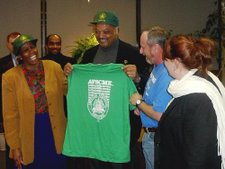 The Institute for Women's Policy Research (IWPR) issued a report this week outlining strategies for unions to use in promoting women's voices and leadership. "Unions are good for women workers, but they could be much better at promoting women into leadership positions," said Amy Caiazza, Director of Democracy and Society Programs at IWPR and the report's author. "The strategies outlined in this report are designed to help women claim a voice of authority in an area that is traditionally dominated by men."
The Institute for Women's Policy Research (IWPR) issued a report this week outlining strategies for unions to use in promoting women's voices and leadership. "Unions are good for women workers, but they could be much better at promoting women into leadership positions," said Amy Caiazza, Director of Democracy and Society Programs at IWPR and the report's author. "The strategies outlined in this report are designed to help women claim a voice of authority in an area that is traditionally dominated by men." Women experience a wide range of obstacles to their union-based activism, according to the report titled I Knew I Could Do This Work. Among them are women's lack of visibility in leadership; the fear of retribution as a result of union activism; discomfort with conflict and public roles; neglected priorities of women workers; the time demands of union work; bias within unions; and lack of awareness of what unions do.
The report, which is based on interviews with women who are union activists, outlines seven strategies to promote women's leadership:
1. Address Women's True Priorities: If unions more visibly address women's concerns, they are more likely to inspire their long-term, active involvement.
2. Create and Support Formal Mentoring Programs: While a good deal of mentoring occurs informally, it could be more intentionally incorporated into union organizing as a source of ongoing support.
3. Provide Opportunities for Women to Strategize Together: Unions can cultivate women-specific training programs, conferences, women's committees, and networks at the local, regional, and national levels.
4. Put Women in Leadership: Placing women in visible local and national leadership roles provides role models and articulates respect for their authority.
5. Highlight the Importance of Women's Contributions: Unions can provide examples of women's current and past union leadership as models for what union women can accomplish.
6. Provide Flexible Options for Involvement: To accommodate the conflicting demands of women's lives, unions can offer creative opportunities to get involved.
7. Provide Training on Mobilizing Women: Unions can train their leaders and organizers on strategies that effectively inspire women's activism and promote their leadership.
"In the end, the strategies in this report are all designed to empower women's activism in public life, within unions and beyond," said Dr. Caiazza. "By claiming leadership, women can transform their lives, their workplaces, and their communities."
I Knew I Could Do This Work was written and published with support from the Berger-Marks Foundation and the Ford Foundation.
To obtain a copy of these reports or to schedule an interview, please contact Elisabeth Crum at 202-785- 5100, ext. 24, or crum@iwpr.org
The Institute for Women's Policy Research conducts rigorous research and disseminates its findings to address the needs of women, promote public dialogue, and strengthen families, communities, and societies. IWPR focuses on issues of poverty and welfare, employment and earnings, work and family, health and safety, and women's civic and political participation.
The Berger Marks Foundation (www.bergermarks.org) seeks to bring the benefits of unionization to working women and to assist organizations committed to those principles. The goal is to provide financial assistance to women who are engaged in union organizing and to assist working women who want to organize other women into unions through training, research and other resources.
The Ford Foundation (www.fordfound.org) is a resource for innovative people and institutions worldwide. The Foundation seeks to strengthen democratic values, reduce poverty and injustice, promote international cooperation, and advance human achievement.
| Institute for Women's Policy Research Elisabeth Crum Communications and Outreach Coordinator phone: 202-785-5100 |




































